Challenges and Successes of Housing in the Global South: Africa
VerifiedAdded on 2020/07/22
|15
|4939
|152
Report
AI Summary
This report delves into the complexities of the construction industry in Africa, highlighting the challenges and successes within the sector. It begins by outlining the historical context and significance of the construction industry as a key economic contributor, emphasizing its role in GDP growth. The report then focuses on the specific challenges faced by the African construction industry, including labor unrest, economic instability, financial constraints, political instability, and technological limitations. It analyzes these challenges in detail, examining their impact on the industry's performance and growth. Furthermore, the report contrasts the African construction industry with those in other continents, providing a comparative analysis. It also explores the successes achieved in Sub-Saharan Africa, identifying effective strategies and initiatives that have contributed to the industry's development. The report provides insights into the need for technological advancements, improved labor practices, and stable political environments to foster sustainable growth and development within the African construction sector, ultimately aiming to provide a comprehensive understanding of the industry's current state and future prospects.

Housing in the global
south.
south.
Paraphrase This Document
Need a fresh take? Get an instant paraphrase of this document with our AI Paraphraser
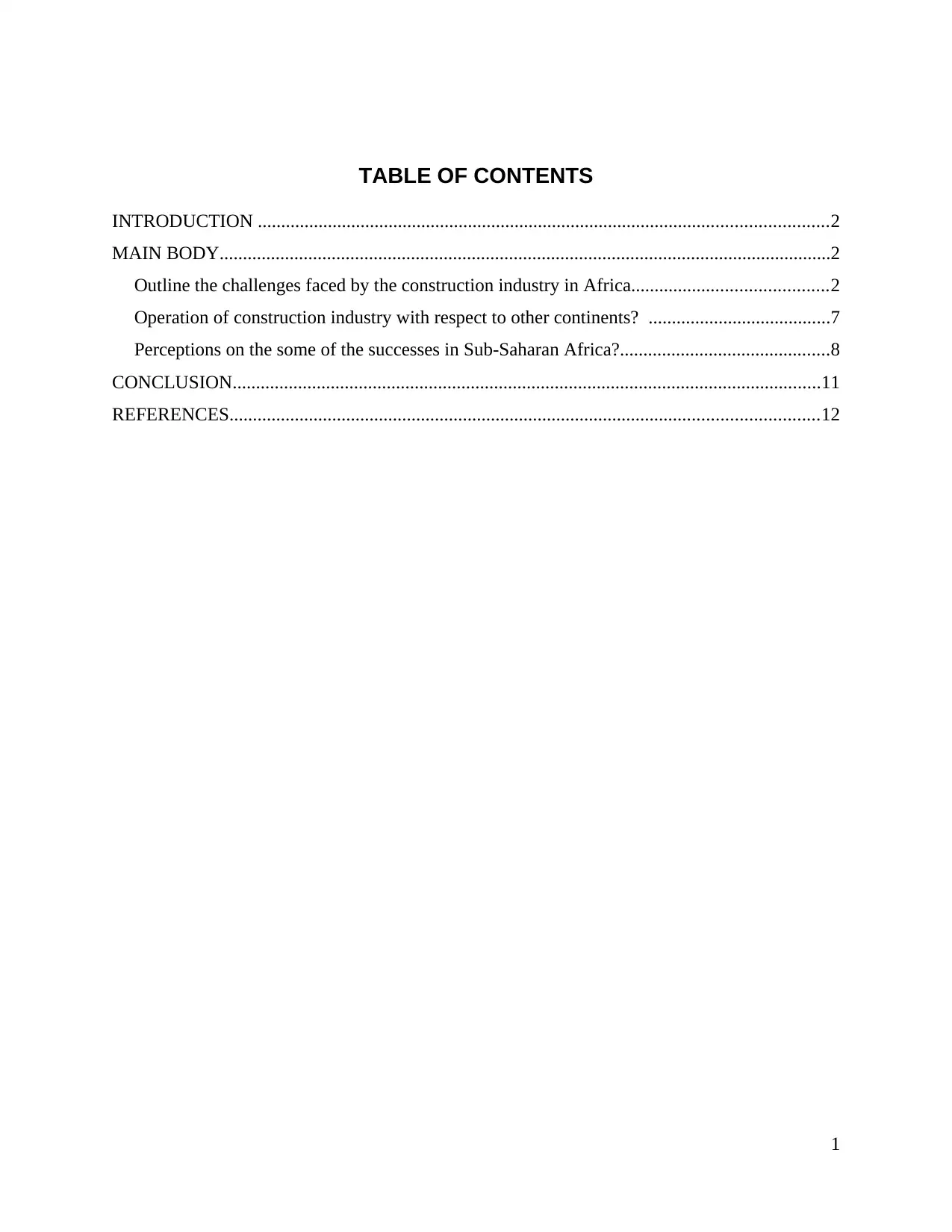
TABLE OF CONTENTS
INTRODUCTION ..........................................................................................................................2
MAIN BODY...................................................................................................................................2
Outline the challenges faced by the construction industry in Africa..........................................2
Operation of construction industry with respect to other continents? .......................................7
Perceptions on the some of the successes in Sub-Saharan Africa?.............................................8
CONCLUSION..............................................................................................................................11
REFERENCES..............................................................................................................................12
1
INTRODUCTION ..........................................................................................................................2
MAIN BODY...................................................................................................................................2
Outline the challenges faced by the construction industry in Africa..........................................2
Operation of construction industry with respect to other continents? .......................................7
Perceptions on the some of the successes in Sub-Saharan Africa?.............................................8
CONCLUSION..............................................................................................................................11
REFERENCES..............................................................................................................................12
1
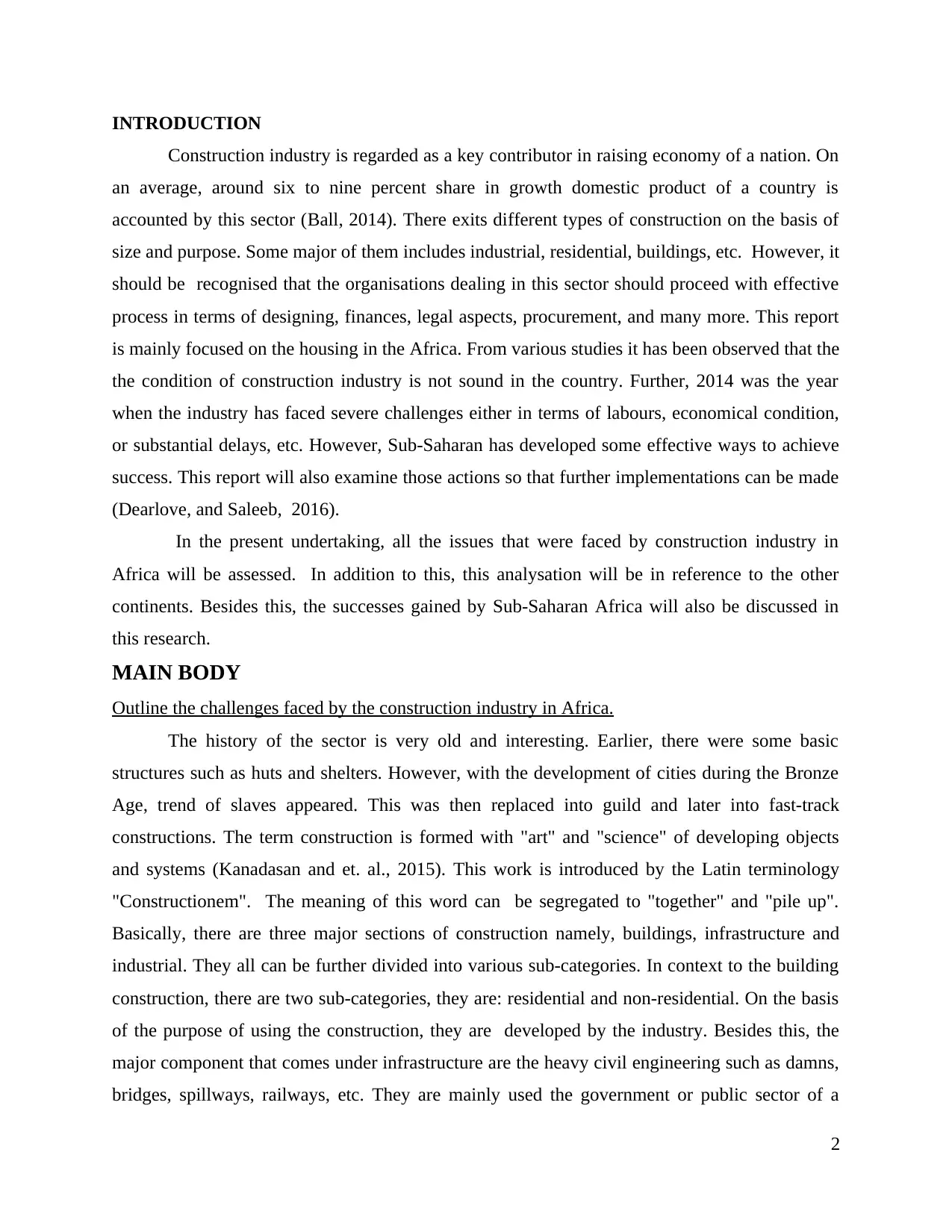
INTRODUCTION
Construction industry is regarded as a key contributor in raising economy of a nation. On
an average, around six to nine percent share in growth domestic product of a country is
accounted by this sector (Ball, 2014). There exits different types of construction on the basis of
size and purpose. Some major of them includes industrial, residential, buildings, etc. However, it
should be recognised that the organisations dealing in this sector should proceed with effective
process in terms of designing, finances, legal aspects, procurement, and many more. This report
is mainly focused on the housing in the Africa. From various studies it has been observed that the
the condition of construction industry is not sound in the country. Further, 2014 was the year
when the industry has faced severe challenges either in terms of labours, economical condition,
or substantial delays, etc. However, Sub-Saharan has developed some effective ways to achieve
success. This report will also examine those actions so that further implementations can be made
(Dearlove, and Saleeb, 2016).
In the present undertaking, all the issues that were faced by construction industry in
Africa will be assessed. In addition to this, this analysation will be in reference to the other
continents. Besides this, the successes gained by Sub-Saharan Africa will also be discussed in
this research.
MAIN BODY
Outline the challenges faced by the construction industry in Africa.
The history of the sector is very old and interesting. Earlier, there were some basic
structures such as huts and shelters. However, with the development of cities during the Bronze
Age, trend of slaves appeared. This was then replaced into guild and later into fast-track
constructions. The term construction is formed with "art" and "science" of developing objects
and systems (Kanadasan and et. al., 2015). This work is introduced by the Latin terminology
"Constructionem". The meaning of this word can be segregated to "together" and "pile up".
Basically, there are three major sections of construction namely, buildings, infrastructure and
industrial. They all can be further divided into various sub-categories. In context to the building
construction, there are two sub-categories, they are: residential and non-residential. On the basis
of the purpose of using the construction, they are developed by the industry. Besides this, the
major component that comes under infrastructure are the heavy civil engineering such as damns,
bridges, spillways, railways, etc. They are mainly used the government or public sector of a
2
Construction industry is regarded as a key contributor in raising economy of a nation. On
an average, around six to nine percent share in growth domestic product of a country is
accounted by this sector (Ball, 2014). There exits different types of construction on the basis of
size and purpose. Some major of them includes industrial, residential, buildings, etc. However, it
should be recognised that the organisations dealing in this sector should proceed with effective
process in terms of designing, finances, legal aspects, procurement, and many more. This report
is mainly focused on the housing in the Africa. From various studies it has been observed that the
the condition of construction industry is not sound in the country. Further, 2014 was the year
when the industry has faced severe challenges either in terms of labours, economical condition,
or substantial delays, etc. However, Sub-Saharan has developed some effective ways to achieve
success. This report will also examine those actions so that further implementations can be made
(Dearlove, and Saleeb, 2016).
In the present undertaking, all the issues that were faced by construction industry in
Africa will be assessed. In addition to this, this analysation will be in reference to the other
continents. Besides this, the successes gained by Sub-Saharan Africa will also be discussed in
this research.
MAIN BODY
Outline the challenges faced by the construction industry in Africa.
The history of the sector is very old and interesting. Earlier, there were some basic
structures such as huts and shelters. However, with the development of cities during the Bronze
Age, trend of slaves appeared. This was then replaced into guild and later into fast-track
constructions. The term construction is formed with "art" and "science" of developing objects
and systems (Kanadasan and et. al., 2015). This work is introduced by the Latin terminology
"Constructionem". The meaning of this word can be segregated to "together" and "pile up".
Basically, there are three major sections of construction namely, buildings, infrastructure and
industrial. They all can be further divided into various sub-categories. In context to the building
construction, there are two sub-categories, they are: residential and non-residential. On the basis
of the purpose of using the construction, they are developed by the industry. Besides this, the
major component that comes under infrastructure are the heavy civil engineering such as damns,
bridges, spillways, railways, etc. They are mainly used the government or public sector of a
2
⊘ This is a preview!⊘
Do you want full access?
Subscribe today to unlock all pages.

Trusted by 1+ million students worldwide
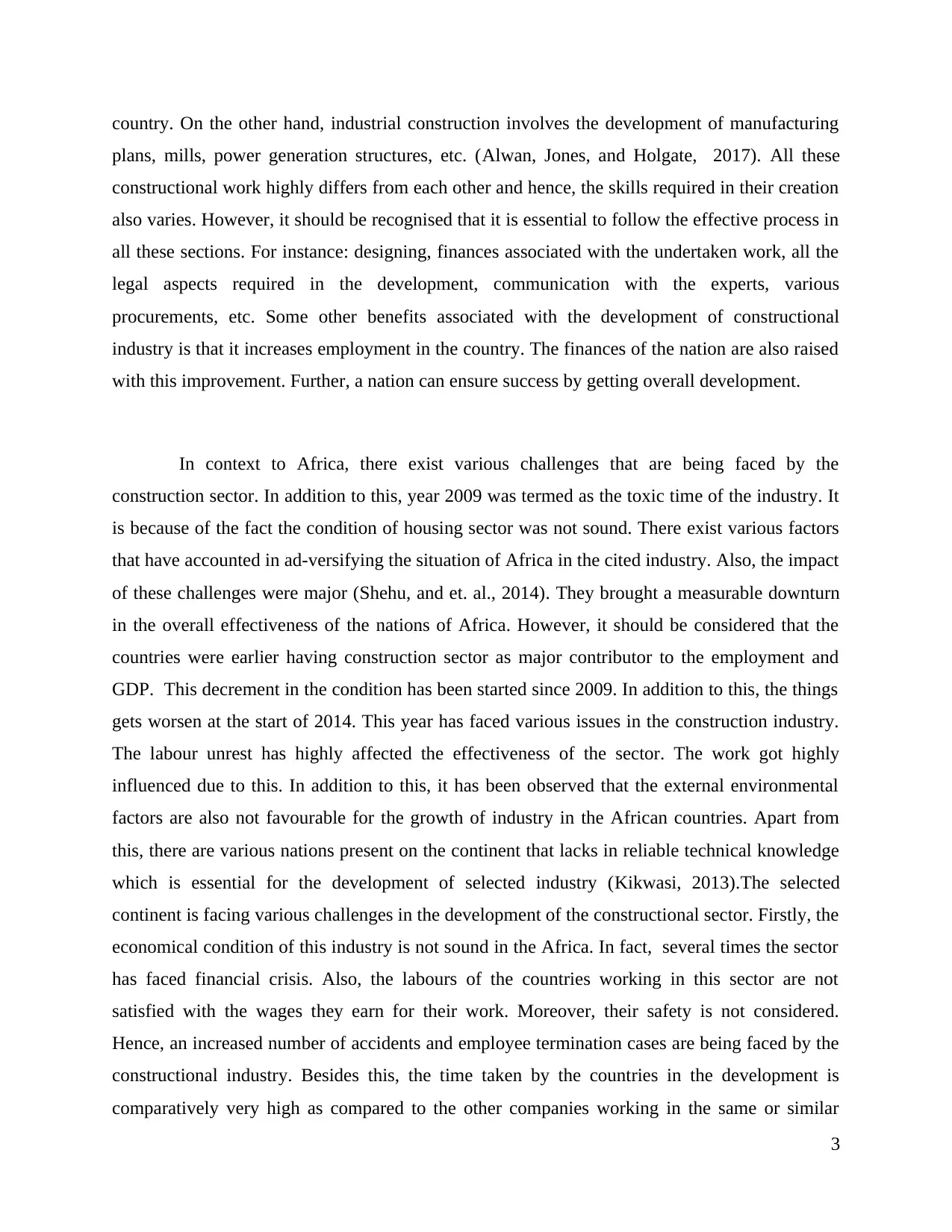
country. On the other hand, industrial construction involves the development of manufacturing
plans, mills, power generation structures, etc. (Alwan, Jones, and Holgate, 2017). All these
constructional work highly differs from each other and hence, the skills required in their creation
also varies. However, it should be recognised that it is essential to follow the effective process in
all these sections. For instance: designing, finances associated with the undertaken work, all the
legal aspects required in the development, communication with the experts, various
procurements, etc. Some other benefits associated with the development of constructional
industry is that it increases employment in the country. The finances of the nation are also raised
with this improvement. Further, a nation can ensure success by getting overall development.
In context to Africa, there exist various challenges that are being faced by the
construction sector. In addition to this, year 2009 was termed as the toxic time of the industry. It
is because of the fact the condition of housing sector was not sound. There exist various factors
that have accounted in ad-versifying the situation of Africa in the cited industry. Also, the impact
of these challenges were major (Shehu, and et. al., 2014). They brought a measurable downturn
in the overall effectiveness of the nations of Africa. However, it should be considered that the
countries were earlier having construction sector as major contributor to the employment and
GDP. This decrement in the condition has been started since 2009. In addition to this, the things
gets worsen at the start of 2014. This year has faced various issues in the construction industry.
The labour unrest has highly affected the effectiveness of the sector. The work got highly
influenced due to this. In addition to this, it has been observed that the external environmental
factors are also not favourable for the growth of industry in the African countries. Apart from
this, there are various nations present on the continent that lacks in reliable technical knowledge
which is essential for the development of selected industry (Kikwasi, 2013).The selected
continent is facing various challenges in the development of the constructional sector. Firstly, the
economical condition of this industry is not sound in the Africa. In fact, several times the sector
has faced financial crisis. Also, the labours of the countries working in this sector are not
satisfied with the wages they earn for their work. Moreover, their safety is not considered.
Hence, an increased number of accidents and employee termination cases are being faced by the
constructional industry. Besides this, the time taken by the countries in the development is
comparatively very high as compared to the other companies working in the same or similar
3
plans, mills, power generation structures, etc. (Alwan, Jones, and Holgate, 2017). All these
constructional work highly differs from each other and hence, the skills required in their creation
also varies. However, it should be recognised that it is essential to follow the effective process in
all these sections. For instance: designing, finances associated with the undertaken work, all the
legal aspects required in the development, communication with the experts, various
procurements, etc. Some other benefits associated with the development of constructional
industry is that it increases employment in the country. The finances of the nation are also raised
with this improvement. Further, a nation can ensure success by getting overall development.
In context to Africa, there exist various challenges that are being faced by the
construction sector. In addition to this, year 2009 was termed as the toxic time of the industry. It
is because of the fact the condition of housing sector was not sound. There exist various factors
that have accounted in ad-versifying the situation of Africa in the cited industry. Also, the impact
of these challenges were major (Shehu, and et. al., 2014). They brought a measurable downturn
in the overall effectiveness of the nations of Africa. However, it should be considered that the
countries were earlier having construction sector as major contributor to the employment and
GDP. This decrement in the condition has been started since 2009. In addition to this, the things
gets worsen at the start of 2014. This year has faced various issues in the construction industry.
The labour unrest has highly affected the effectiveness of the sector. The work got highly
influenced due to this. In addition to this, it has been observed that the external environmental
factors are also not favourable for the growth of industry in the African countries. Apart from
this, there are various nations present on the continent that lacks in reliable technical knowledge
which is essential for the development of selected industry (Kikwasi, 2013).The selected
continent is facing various challenges in the development of the constructional sector. Firstly, the
economical condition of this industry is not sound in the Africa. In fact, several times the sector
has faced financial crisis. Also, the labours of the countries working in this sector are not
satisfied with the wages they earn for their work. Moreover, their safety is not considered.
Hence, an increased number of accidents and employee termination cases are being faced by the
constructional industry. Besides this, the time taken by the countries in the development is
comparatively very high as compared to the other companies working in the same or similar
3
Paraphrase This Document
Need a fresh take? Get an instant paraphrase of this document with our AI Paraphraser
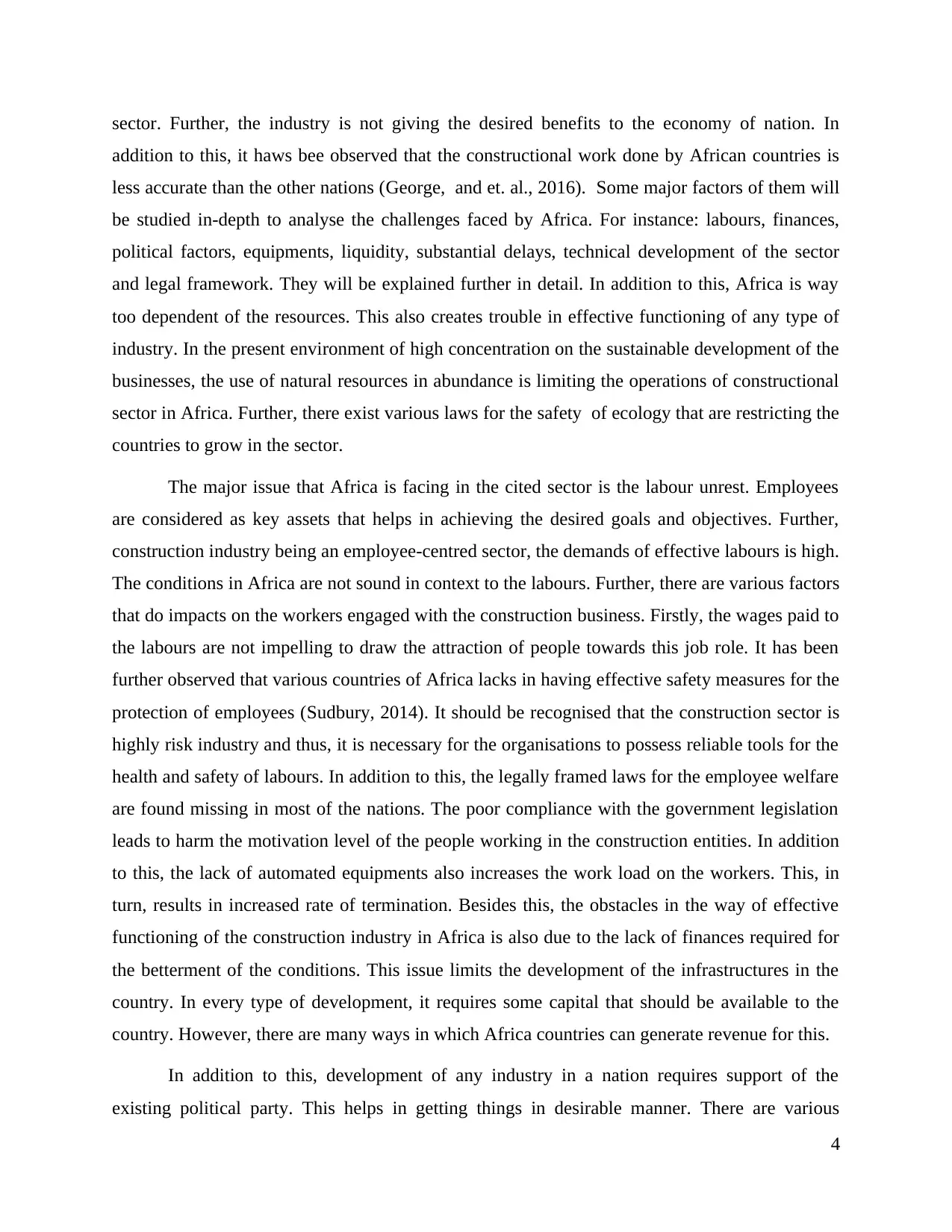
sector. Further, the industry is not giving the desired benefits to the economy of nation. In
addition to this, it haws bee observed that the constructional work done by African countries is
less accurate than the other nations (George, and et. al., 2016). Some major factors of them will
be studied in-depth to analyse the challenges faced by Africa. For instance: labours, finances,
political factors, equipments, liquidity, substantial delays, technical development of the sector
and legal framework. They will be explained further in detail. In addition to this, Africa is way
too dependent of the resources. This also creates trouble in effective functioning of any type of
industry. In the present environment of high concentration on the sustainable development of the
businesses, the use of natural resources in abundance is limiting the operations of constructional
sector in Africa. Further, there exist various laws for the safety of ecology that are restricting the
countries to grow in the sector.
The major issue that Africa is facing in the cited sector is the labour unrest. Employees
are considered as key assets that helps in achieving the desired goals and objectives. Further,
construction industry being an employee-centred sector, the demands of effective labours is high.
The conditions in Africa are not sound in context to the labours. Further, there are various factors
that do impacts on the workers engaged with the construction business. Firstly, the wages paid to
the labours are not impelling to draw the attraction of people towards this job role. It has been
further observed that various countries of Africa lacks in having effective safety measures for the
protection of employees (Sudbury, 2014). It should be recognised that the construction sector is
highly risk industry and thus, it is necessary for the organisations to possess reliable tools for the
health and safety of labours. In addition to this, the legally framed laws for the employee welfare
are found missing in most of the nations. The poor compliance with the government legislation
leads to harm the motivation level of the people working in the construction entities. In addition
to this, the lack of automated equipments also increases the work load on the workers. This, in
turn, results in increased rate of termination. Besides this, the obstacles in the way of effective
functioning of the construction industry in Africa is also due to the lack of finances required for
the betterment of the conditions. This issue limits the development of the infrastructures in the
country. In every type of development, it requires some capital that should be available to the
country. However, there are many ways in which Africa countries can generate revenue for this.
In addition to this, development of any industry in a nation requires support of the
existing political party. This helps in getting things in desirable manner. There are various
4
addition to this, it haws bee observed that the constructional work done by African countries is
less accurate than the other nations (George, and et. al., 2016). Some major factors of them will
be studied in-depth to analyse the challenges faced by Africa. For instance: labours, finances,
political factors, equipments, liquidity, substantial delays, technical development of the sector
and legal framework. They will be explained further in detail. In addition to this, Africa is way
too dependent of the resources. This also creates trouble in effective functioning of any type of
industry. In the present environment of high concentration on the sustainable development of the
businesses, the use of natural resources in abundance is limiting the operations of constructional
sector in Africa. Further, there exist various laws for the safety of ecology that are restricting the
countries to grow in the sector.
The major issue that Africa is facing in the cited sector is the labour unrest. Employees
are considered as key assets that helps in achieving the desired goals and objectives. Further,
construction industry being an employee-centred sector, the demands of effective labours is high.
The conditions in Africa are not sound in context to the labours. Further, there are various factors
that do impacts on the workers engaged with the construction business. Firstly, the wages paid to
the labours are not impelling to draw the attraction of people towards this job role. It has been
further observed that various countries of Africa lacks in having effective safety measures for the
protection of employees (Sudbury, 2014). It should be recognised that the construction sector is
highly risk industry and thus, it is necessary for the organisations to possess reliable tools for the
health and safety of labours. In addition to this, the legally framed laws for the employee welfare
are found missing in most of the nations. The poor compliance with the government legislation
leads to harm the motivation level of the people working in the construction entities. In addition
to this, the lack of automated equipments also increases the work load on the workers. This, in
turn, results in increased rate of termination. Besides this, the obstacles in the way of effective
functioning of the construction industry in Africa is also due to the lack of finances required for
the betterment of the conditions. This issue limits the development of the infrastructures in the
country. In every type of development, it requires some capital that should be available to the
country. However, there are many ways in which Africa countries can generate revenue for this.
In addition to this, development of any industry in a nation requires support of the
existing political party. This helps in getting things in desirable manner. There are various
4
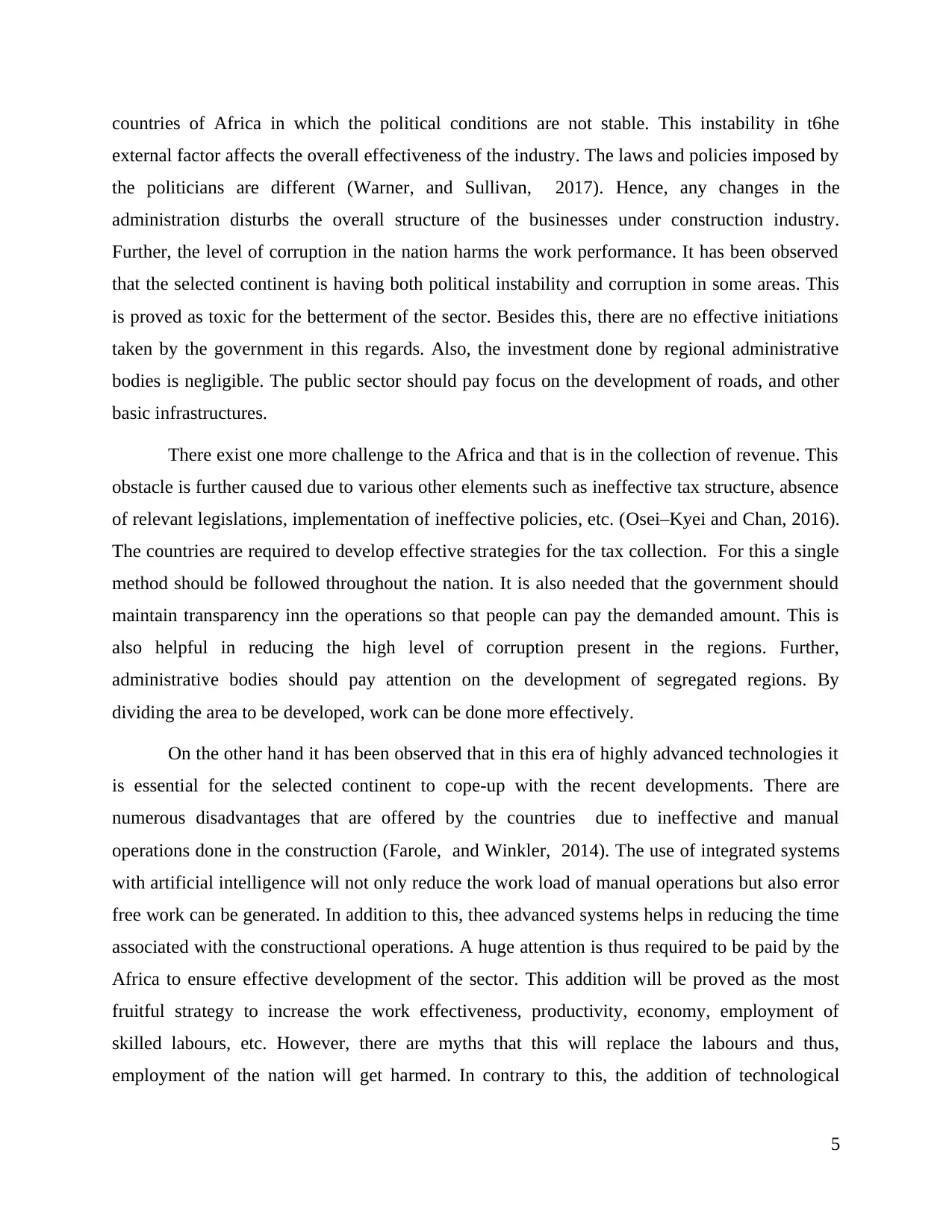
countries of Africa in which the political conditions are not stable. This instability in t6he
external factor affects the overall effectiveness of the industry. The laws and policies imposed by
the politicians are different (Warner, and Sullivan, 2017). Hence, any changes in the
administration disturbs the overall structure of the businesses under construction industry.
Further, the level of corruption in the nation harms the work performance. It has been observed
that the selected continent is having both political instability and corruption in some areas. This
is proved as toxic for the betterment of the sector. Besides this, there are no effective initiations
taken by the government in this regards. Also, the investment done by regional administrative
bodies is negligible. The public sector should pay focus on the development of roads, and other
basic infrastructures.
There exist one more challenge to the Africa and that is in the collection of revenue. This
obstacle is further caused due to various other elements such as ineffective tax structure, absence
of relevant legislations, implementation of ineffective policies, etc. (Osei–Kyei and Chan, 2016).
The countries are required to develop effective strategies for the tax collection. For this a single
method should be followed throughout the nation. It is also needed that the government should
maintain transparency inn the operations so that people can pay the demanded amount. This is
also helpful in reducing the high level of corruption present in the regions. Further,
administrative bodies should pay attention on the development of segregated regions. By
dividing the area to be developed, work can be done more effectively.
On the other hand it has been observed that in this era of highly advanced technologies it
is essential for the selected continent to cope-up with the recent developments. There are
numerous disadvantages that are offered by the countries due to ineffective and manual
operations done in the construction (Farole, and Winkler, 2014). The use of integrated systems
with artificial intelligence will not only reduce the work load of manual operations but also error
free work can be generated. In addition to this, thee advanced systems helps in reducing the time
associated with the constructional operations. A huge attention is thus required to be paid by the
Africa to ensure effective development of the sector. This addition will be proved as the most
fruitful strategy to increase the work effectiveness, productivity, economy, employment of
skilled labours, etc. However, there are myths that this will replace the labours and thus,
employment of the nation will get harmed. In contrary to this, the addition of technological
5
external factor affects the overall effectiveness of the industry. The laws and policies imposed by
the politicians are different (Warner, and Sullivan, 2017). Hence, any changes in the
administration disturbs the overall structure of the businesses under construction industry.
Further, the level of corruption in the nation harms the work performance. It has been observed
that the selected continent is having both political instability and corruption in some areas. This
is proved as toxic for the betterment of the sector. Besides this, there are no effective initiations
taken by the government in this regards. Also, the investment done by regional administrative
bodies is negligible. The public sector should pay focus on the development of roads, and other
basic infrastructures.
There exist one more challenge to the Africa and that is in the collection of revenue. This
obstacle is further caused due to various other elements such as ineffective tax structure, absence
of relevant legislations, implementation of ineffective policies, etc. (Osei–Kyei and Chan, 2016).
The countries are required to develop effective strategies for the tax collection. For this a single
method should be followed throughout the nation. It is also needed that the government should
maintain transparency inn the operations so that people can pay the demanded amount. This is
also helpful in reducing the high level of corruption present in the regions. Further,
administrative bodies should pay attention on the development of segregated regions. By
dividing the area to be developed, work can be done more effectively.
On the other hand it has been observed that in this era of highly advanced technologies it
is essential for the selected continent to cope-up with the recent developments. There are
numerous disadvantages that are offered by the countries due to ineffective and manual
operations done in the construction (Farole, and Winkler, 2014). The use of integrated systems
with artificial intelligence will not only reduce the work load of manual operations but also error
free work can be generated. In addition to this, thee advanced systems helps in reducing the time
associated with the constructional operations. A huge attention is thus required to be paid by the
Africa to ensure effective development of the sector. This addition will be proved as the most
fruitful strategy to increase the work effectiveness, productivity, economy, employment of
skilled labours, etc. However, there are myths that this will replace the labours and thus,
employment of the nation will get harmed. In contrary to this, the addition of technological
5
⊘ This is a preview!⊘
Do you want full access?
Subscribe today to unlock all pages.

Trusted by 1+ million students worldwide
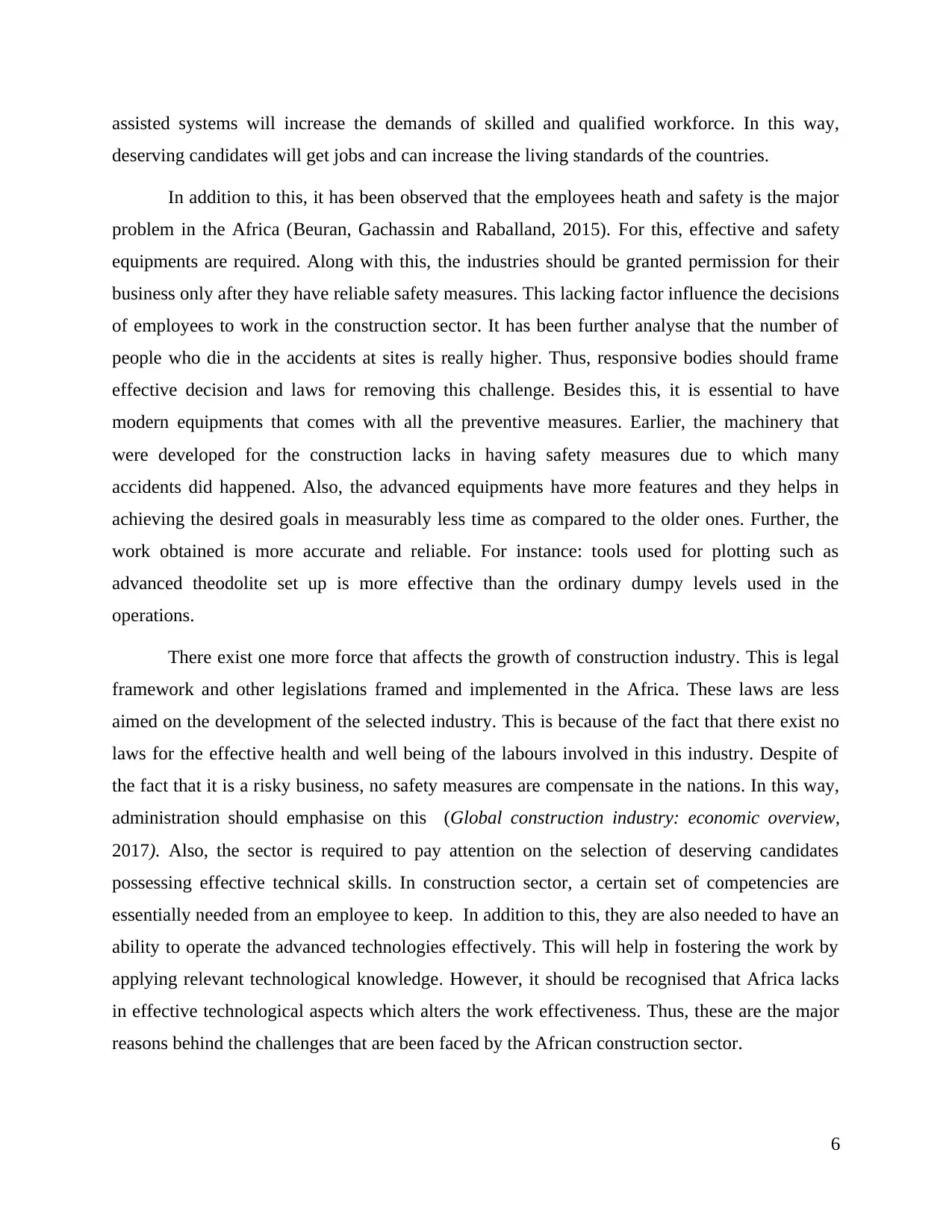
assisted systems will increase the demands of skilled and qualified workforce. In this way,
deserving candidates will get jobs and can increase the living standards of the countries.
In addition to this, it has been observed that the employees heath and safety is the major
problem in the Africa (Beuran, Gachassin and Raballand, 2015). For this, effective and safety
equipments are required. Along with this, the industries should be granted permission for their
business only after they have reliable safety measures. This lacking factor influence the decisions
of employees to work in the construction sector. It has been further analyse that the number of
people who die in the accidents at sites is really higher. Thus, responsive bodies should frame
effective decision and laws for removing this challenge. Besides this, it is essential to have
modern equipments that comes with all the preventive measures. Earlier, the machinery that
were developed for the construction lacks in having safety measures due to which many
accidents did happened. Also, the advanced equipments have more features and they helps in
achieving the desired goals in measurably less time as compared to the older ones. Further, the
work obtained is more accurate and reliable. For instance: tools used for plotting such as
advanced theodolite set up is more effective than the ordinary dumpy levels used in the
operations.
There exist one more force that affects the growth of construction industry. This is legal
framework and other legislations framed and implemented in the Africa. These laws are less
aimed on the development of the selected industry. This is because of the fact that there exist no
laws for the effective health and well being of the labours involved in this industry. Despite of
the fact that it is a risky business, no safety measures are compensate in the nations. In this way,
administration should emphasise on this (Global construction industry: economic overview,
2017). Also, the sector is required to pay attention on the selection of deserving candidates
possessing effective technical skills. In construction sector, a certain set of competencies are
essentially needed from an employee to keep. In addition to this, they are also needed to have an
ability to operate the advanced technologies effectively. This will help in fostering the work by
applying relevant technological knowledge. However, it should be recognised that Africa lacks
in effective technological aspects which alters the work effectiveness. Thus, these are the major
reasons behind the challenges that are been faced by the African construction sector.
6
deserving candidates will get jobs and can increase the living standards of the countries.
In addition to this, it has been observed that the employees heath and safety is the major
problem in the Africa (Beuran, Gachassin and Raballand, 2015). For this, effective and safety
equipments are required. Along with this, the industries should be granted permission for their
business only after they have reliable safety measures. This lacking factor influence the decisions
of employees to work in the construction sector. It has been further analyse that the number of
people who die in the accidents at sites is really higher. Thus, responsive bodies should frame
effective decision and laws for removing this challenge. Besides this, it is essential to have
modern equipments that comes with all the preventive measures. Earlier, the machinery that
were developed for the construction lacks in having safety measures due to which many
accidents did happened. Also, the advanced equipments have more features and they helps in
achieving the desired goals in measurably less time as compared to the older ones. Further, the
work obtained is more accurate and reliable. For instance: tools used for plotting such as
advanced theodolite set up is more effective than the ordinary dumpy levels used in the
operations.
There exist one more force that affects the growth of construction industry. This is legal
framework and other legislations framed and implemented in the Africa. These laws are less
aimed on the development of the selected industry. This is because of the fact that there exist no
laws for the effective health and well being of the labours involved in this industry. Despite of
the fact that it is a risky business, no safety measures are compensate in the nations. In this way,
administration should emphasise on this (Global construction industry: economic overview,
2017). Also, the sector is required to pay attention on the selection of deserving candidates
possessing effective technical skills. In construction sector, a certain set of competencies are
essentially needed from an employee to keep. In addition to this, they are also needed to have an
ability to operate the advanced technologies effectively. This will help in fostering the work by
applying relevant technological knowledge. However, it should be recognised that Africa lacks
in effective technological aspects which alters the work effectiveness. Thus, these are the major
reasons behind the challenges that are been faced by the African construction sector.
6
Paraphrase This Document
Need a fresh take? Get an instant paraphrase of this document with our AI Paraphraser
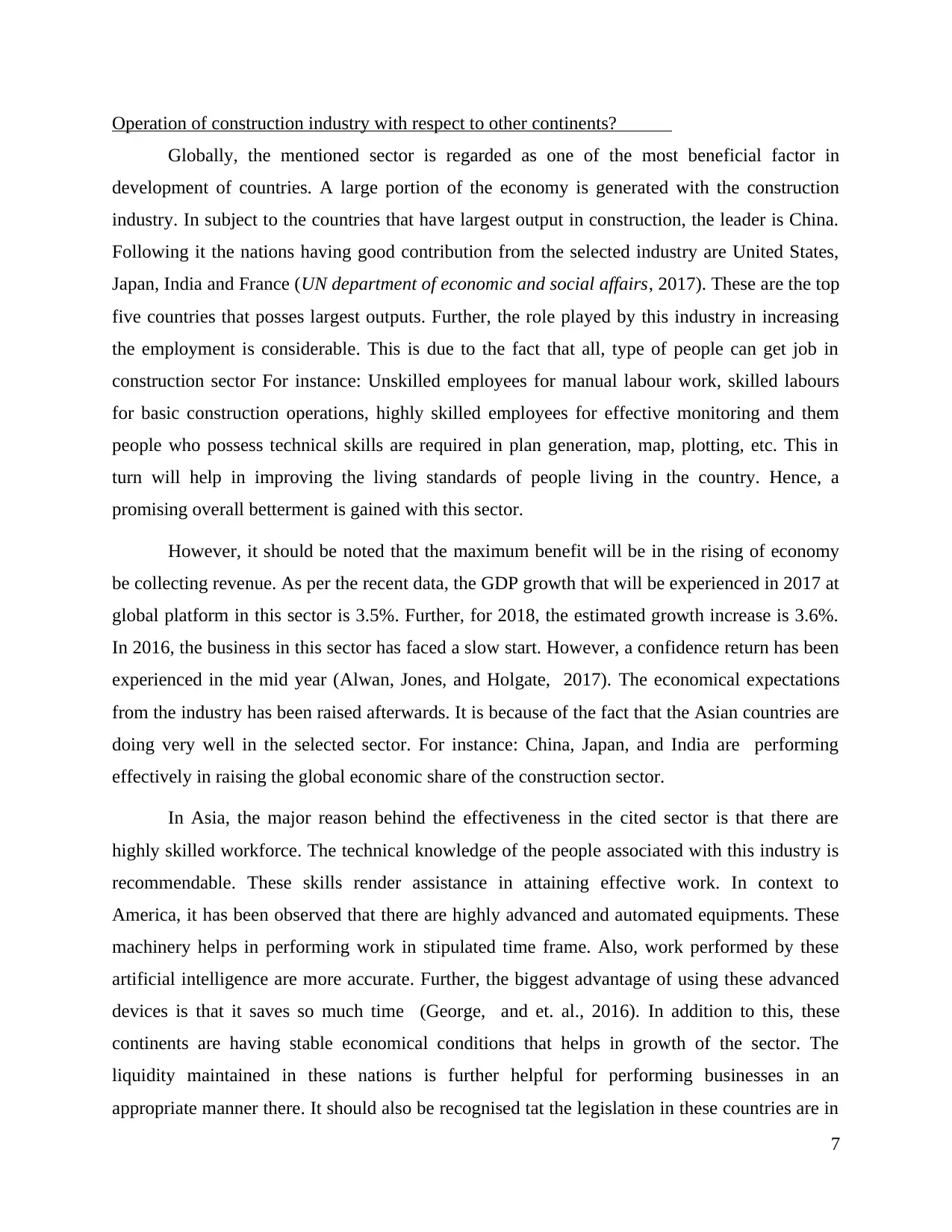
Operation of construction industry with respect to other continents?
Globally, the mentioned sector is regarded as one of the most beneficial factor in
development of countries. A large portion of the economy is generated with the construction
industry. In subject to the countries that have largest output in construction, the leader is China.
Following it the nations having good contribution from the selected industry are United States,
Japan, India and France (UN department of economic and social affairs, 2017). These are the top
five countries that posses largest outputs. Further, the role played by this industry in increasing
the employment is considerable. This is due to the fact that all, type of people can get job in
construction sector For instance: Unskilled employees for manual labour work, skilled labours
for basic construction operations, highly skilled employees for effective monitoring and them
people who possess technical skills are required in plan generation, map, plotting, etc. This in
turn will help in improving the living standards of people living in the country. Hence, a
promising overall betterment is gained with this sector.
However, it should be noted that the maximum benefit will be in the rising of economy
be collecting revenue. As per the recent data, the GDP growth that will be experienced in 2017 at
global platform in this sector is 3.5%. Further, for 2018, the estimated growth increase is 3.6%.
In 2016, the business in this sector has faced a slow start. However, a confidence return has been
experienced in the mid year (Alwan, Jones, and Holgate, 2017). The economical expectations
from the industry has been raised afterwards. It is because of the fact that the Asian countries are
doing very well in the selected sector. For instance: China, Japan, and India are performing
effectively in raising the global economic share of the construction sector.
In Asia, the major reason behind the effectiveness in the cited sector is that there are
highly skilled workforce. The technical knowledge of the people associated with this industry is
recommendable. These skills render assistance in attaining effective work. In context to
America, it has been observed that there are highly advanced and automated equipments. These
machinery helps in performing work in stipulated time frame. Also, work performed by these
artificial intelligence are more accurate. Further, the biggest advantage of using these advanced
devices is that it saves so much time (George, and et. al., 2016). In addition to this, these
continents are having stable economical conditions that helps in growth of the sector. The
liquidity maintained in these nations is further helpful for performing businesses in an
appropriate manner there. It should also be recognised tat the legislation in these countries are in
7
Globally, the mentioned sector is regarded as one of the most beneficial factor in
development of countries. A large portion of the economy is generated with the construction
industry. In subject to the countries that have largest output in construction, the leader is China.
Following it the nations having good contribution from the selected industry are United States,
Japan, India and France (UN department of economic and social affairs, 2017). These are the top
five countries that posses largest outputs. Further, the role played by this industry in increasing
the employment is considerable. This is due to the fact that all, type of people can get job in
construction sector For instance: Unskilled employees for manual labour work, skilled labours
for basic construction operations, highly skilled employees for effective monitoring and them
people who possess technical skills are required in plan generation, map, plotting, etc. This in
turn will help in improving the living standards of people living in the country. Hence, a
promising overall betterment is gained with this sector.
However, it should be noted that the maximum benefit will be in the rising of economy
be collecting revenue. As per the recent data, the GDP growth that will be experienced in 2017 at
global platform in this sector is 3.5%. Further, for 2018, the estimated growth increase is 3.6%.
In 2016, the business in this sector has faced a slow start. However, a confidence return has been
experienced in the mid year (Alwan, Jones, and Holgate, 2017). The economical expectations
from the industry has been raised afterwards. It is because of the fact that the Asian countries are
doing very well in the selected sector. For instance: China, Japan, and India are performing
effectively in raising the global economic share of the construction sector.
In Asia, the major reason behind the effectiveness in the cited sector is that there are
highly skilled workforce. The technical knowledge of the people associated with this industry is
recommendable. These skills render assistance in attaining effective work. In context to
America, it has been observed that there are highly advanced and automated equipments. These
machinery helps in performing work in stipulated time frame. Also, work performed by these
artificial intelligence are more accurate. Further, the biggest advantage of using these advanced
devices is that it saves so much time (George, and et. al., 2016). In addition to this, these
continents are having stable economical conditions that helps in growth of the sector. The
liquidity maintained in these nations is further helpful for performing businesses in an
appropriate manner there. It should also be recognised tat the legislation in these countries are in
7
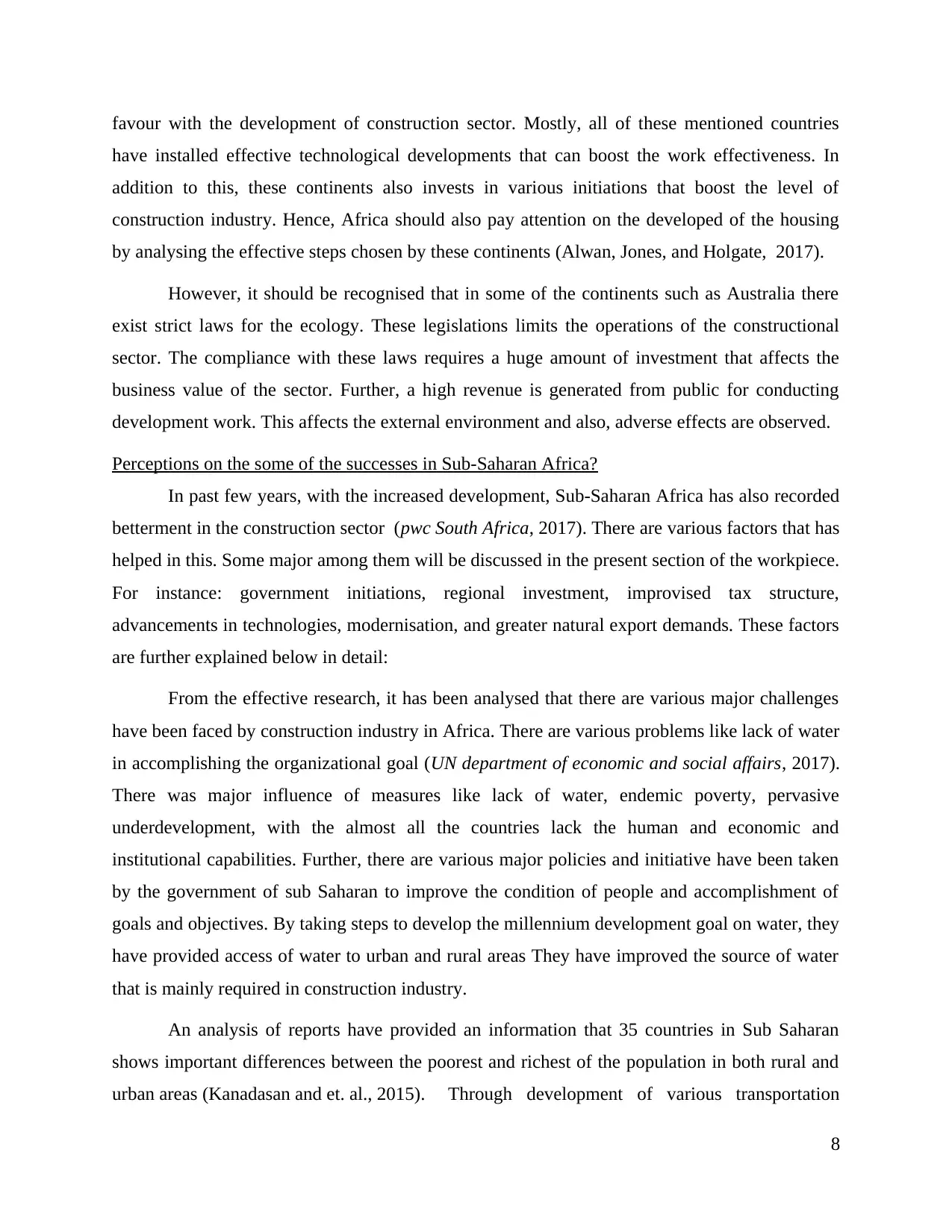
favour with the development of construction sector. Mostly, all of these mentioned countries
have installed effective technological developments that can boost the work effectiveness. In
addition to this, these continents also invests in various initiations that boost the level of
construction industry. Hence, Africa should also pay attention on the developed of the housing
by analysing the effective steps chosen by these continents (Alwan, Jones, and Holgate, 2017).
However, it should be recognised that in some of the continents such as Australia there
exist strict laws for the ecology. These legislations limits the operations of the constructional
sector. The compliance with these laws requires a huge amount of investment that affects the
business value of the sector. Further, a high revenue is generated from public for conducting
development work. This affects the external environment and also, adverse effects are observed.
Perceptions on the some of the successes in Sub-Saharan Africa?
In past few years, with the increased development, Sub-Saharan Africa has also recorded
betterment in the construction sector (pwc South Africa, 2017). There are various factors that has
helped in this. Some major among them will be discussed in the present section of the workpiece.
For instance: government initiations, regional investment, improvised tax structure,
advancements in technologies, modernisation, and greater natural export demands. These factors
are further explained below in detail:
From the effective research, it has been analysed that there are various major challenges
have been faced by construction industry in Africa. There are various problems like lack of water
in accomplishing the organizational goal (UN department of economic and social affairs, 2017).
There was major influence of measures like lack of water, endemic poverty, pervasive
underdevelopment, with the almost all the countries lack the human and economic and
institutional capabilities. Further, there are various major policies and initiative have been taken
by the government of sub Saharan to improve the condition of people and accomplishment of
goals and objectives. By taking steps to develop the millennium development goal on water, they
have provided access of water to urban and rural areas They have improved the source of water
that is mainly required in construction industry.
An analysis of reports have provided an information that 35 countries in Sub Saharan
shows important differences between the poorest and richest of the population in both rural and
urban areas (Kanadasan and et. al., 2015). Through development of various transportation
8
have installed effective technological developments that can boost the work effectiveness. In
addition to this, these continents also invests in various initiations that boost the level of
construction industry. Hence, Africa should also pay attention on the developed of the housing
by analysing the effective steps chosen by these continents (Alwan, Jones, and Holgate, 2017).
However, it should be recognised that in some of the continents such as Australia there
exist strict laws for the ecology. These legislations limits the operations of the constructional
sector. The compliance with these laws requires a huge amount of investment that affects the
business value of the sector. Further, a high revenue is generated from public for conducting
development work. This affects the external environment and also, adverse effects are observed.
Perceptions on the some of the successes in Sub-Saharan Africa?
In past few years, with the increased development, Sub-Saharan Africa has also recorded
betterment in the construction sector (pwc South Africa, 2017). There are various factors that has
helped in this. Some major among them will be discussed in the present section of the workpiece.
For instance: government initiations, regional investment, improvised tax structure,
advancements in technologies, modernisation, and greater natural export demands. These factors
are further explained below in detail:
From the effective research, it has been analysed that there are various major challenges
have been faced by construction industry in Africa. There are various problems like lack of water
in accomplishing the organizational goal (UN department of economic and social affairs, 2017).
There was major influence of measures like lack of water, endemic poverty, pervasive
underdevelopment, with the almost all the countries lack the human and economic and
institutional capabilities. Further, there are various major policies and initiative have been taken
by the government of sub Saharan to improve the condition of people and accomplishment of
goals and objectives. By taking steps to develop the millennium development goal on water, they
have provided access of water to urban and rural areas They have improved the source of water
that is mainly required in construction industry.
An analysis of reports have provided an information that 35 countries in Sub Saharan
shows important differences between the poorest and richest of the population in both rural and
urban areas (Kanadasan and et. al., 2015). Through development of various transportation
8
⊘ This is a preview!⊘
Do you want full access?
Subscribe today to unlock all pages.

Trusted by 1+ million students worldwide
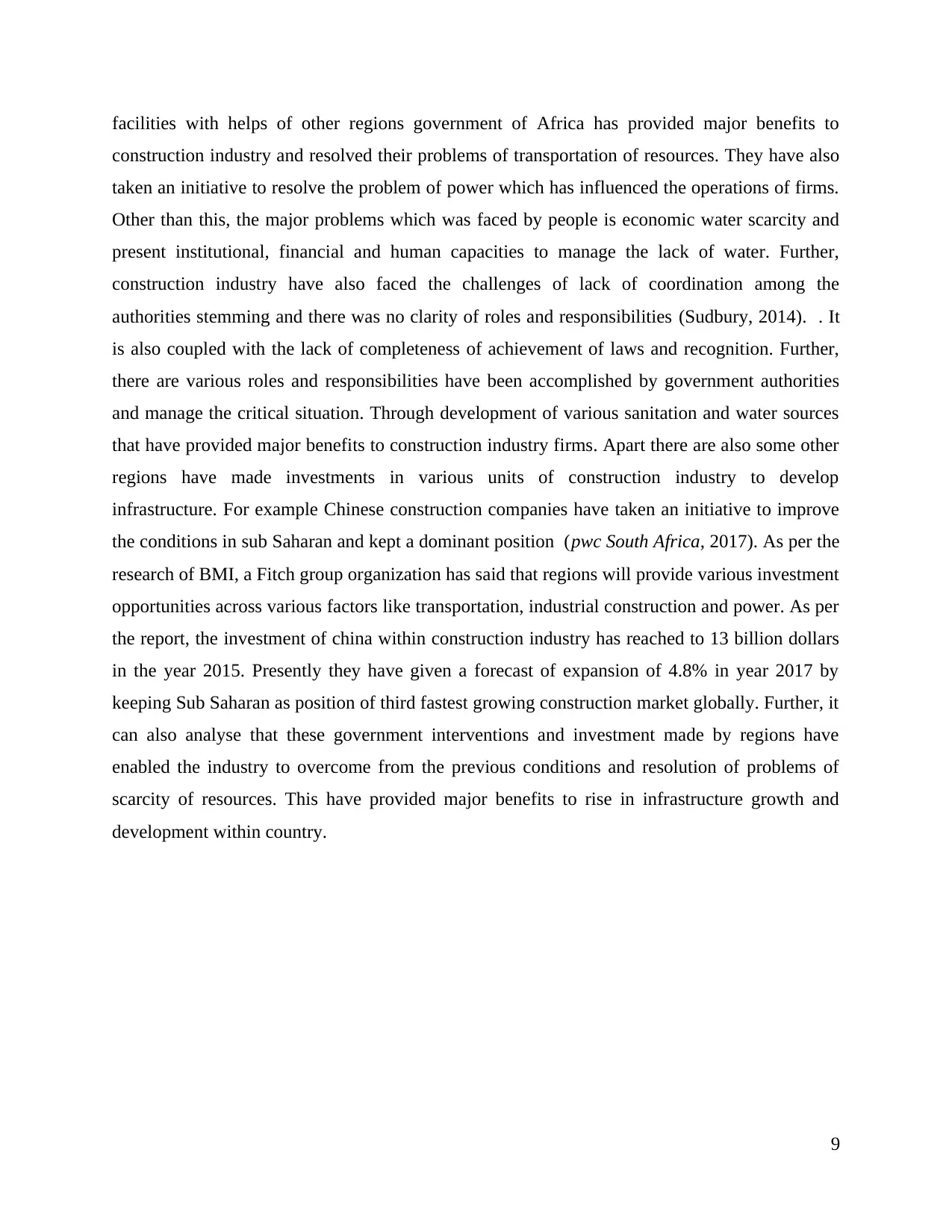
facilities with helps of other regions government of Africa has provided major benefits to
construction industry and resolved their problems of transportation of resources. They have also
taken an initiative to resolve the problem of power which has influenced the operations of firms.
Other than this, the major problems which was faced by people is economic water scarcity and
present institutional, financial and human capacities to manage the lack of water. Further,
construction industry have also faced the challenges of lack of coordination among the
authorities stemming and there was no clarity of roles and responsibilities (Sudbury, 2014). . It
is also coupled with the lack of completeness of achievement of laws and recognition. Further,
there are various roles and responsibilities have been accomplished by government authorities
and manage the critical situation. Through development of various sanitation and water sources
that have provided major benefits to construction industry firms. Apart there are also some other
regions have made investments in various units of construction industry to develop
infrastructure. For example Chinese construction companies have taken an initiative to improve
the conditions in sub Saharan and kept a dominant position (pwc South Africa, 2017). As per the
research of BMI, a Fitch group organization has said that regions will provide various investment
opportunities across various factors like transportation, industrial construction and power. As per
the report, the investment of china within construction industry has reached to 13 billion dollars
in the year 2015. Presently they have given a forecast of expansion of 4.8% in year 2017 by
keeping Sub Saharan as position of third fastest growing construction market globally. Further, it
can also analyse that these government interventions and investment made by regions have
enabled the industry to overcome from the previous conditions and resolution of problems of
scarcity of resources. This have provided major benefits to rise in infrastructure growth and
development within country.
9
construction industry and resolved their problems of transportation of resources. They have also
taken an initiative to resolve the problem of power which has influenced the operations of firms.
Other than this, the major problems which was faced by people is economic water scarcity and
present institutional, financial and human capacities to manage the lack of water. Further,
construction industry have also faced the challenges of lack of coordination among the
authorities stemming and there was no clarity of roles and responsibilities (Sudbury, 2014). . It
is also coupled with the lack of completeness of achievement of laws and recognition. Further,
there are various roles and responsibilities have been accomplished by government authorities
and manage the critical situation. Through development of various sanitation and water sources
that have provided major benefits to construction industry firms. Apart there are also some other
regions have made investments in various units of construction industry to develop
infrastructure. For example Chinese construction companies have taken an initiative to improve
the conditions in sub Saharan and kept a dominant position (pwc South Africa, 2017). As per the
research of BMI, a Fitch group organization has said that regions will provide various investment
opportunities across various factors like transportation, industrial construction and power. As per
the report, the investment of china within construction industry has reached to 13 billion dollars
in the year 2015. Presently they have given a forecast of expansion of 4.8% in year 2017 by
keeping Sub Saharan as position of third fastest growing construction market globally. Further, it
can also analyse that these government interventions and investment made by regions have
enabled the industry to overcome from the previous conditions and resolution of problems of
scarcity of resources. This have provided major benefits to rise in infrastructure growth and
development within country.
9
Paraphrase This Document
Need a fresh take? Get an instant paraphrase of this document with our AI Paraphraser
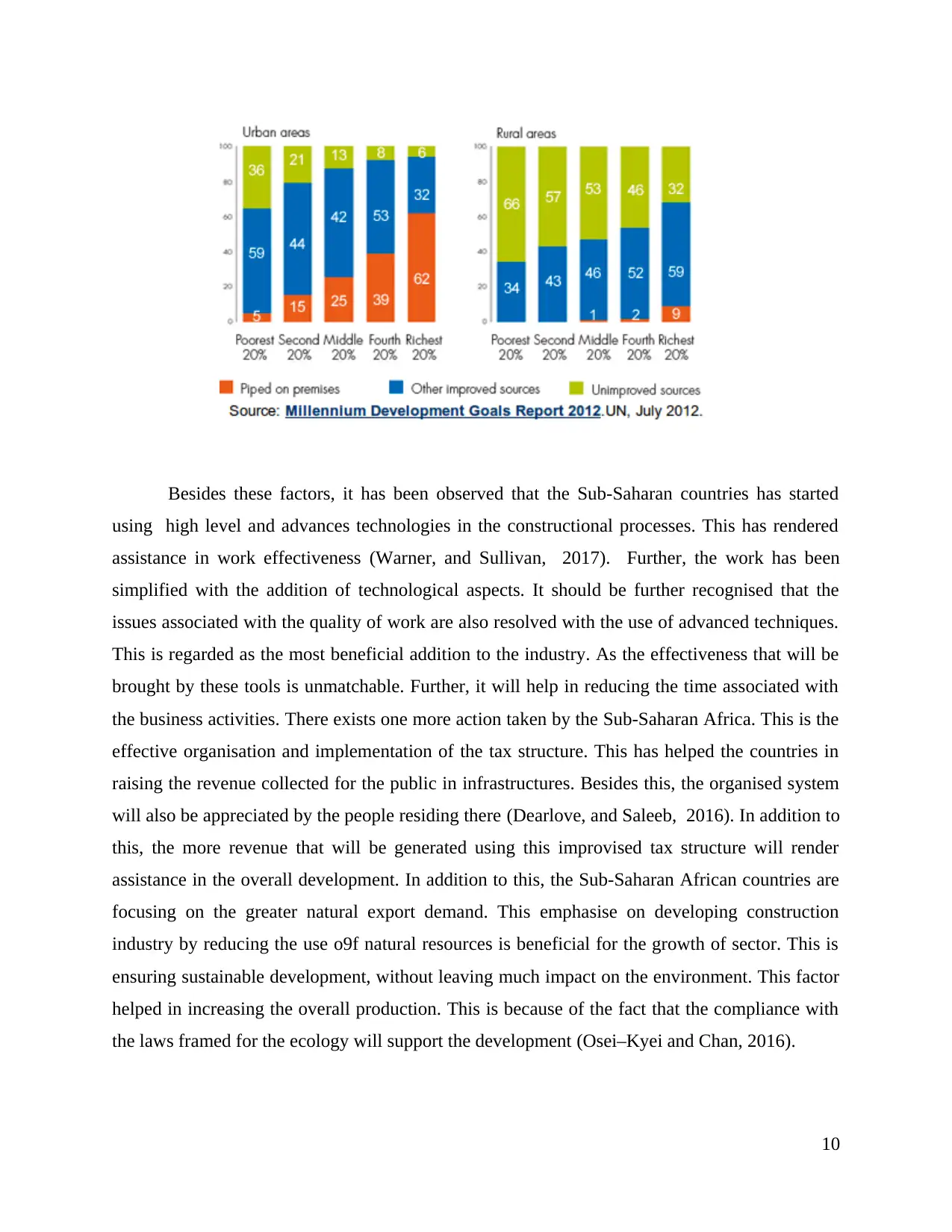
Besides these factors, it has been observed that the Sub-Saharan countries has started
using high level and advances technologies in the constructional processes. This has rendered
assistance in work effectiveness (Warner, and Sullivan, 2017). Further, the work has been
simplified with the addition of technological aspects. It should be further recognised that the
issues associated with the quality of work are also resolved with the use of advanced techniques.
This is regarded as the most beneficial addition to the industry. As the effectiveness that will be
brought by these tools is unmatchable. Further, it will help in reducing the time associated with
the business activities. There exists one more action taken by the Sub-Saharan Africa. This is the
effective organisation and implementation of the tax structure. This has helped the countries in
raising the revenue collected for the public in infrastructures. Besides this, the organised system
will also be appreciated by the people residing there (Dearlove, and Saleeb, 2016). In addition to
this, the more revenue that will be generated using this improvised tax structure will render
assistance in the overall development. In addition to this, the Sub-Saharan African countries are
focusing on the greater natural export demand. This emphasise on developing construction
industry by reducing the use o9f natural resources is beneficial for the growth of sector. This is
ensuring sustainable development, without leaving much impact on the environment. This factor
helped in increasing the overall production. This is because of the fact that the compliance with
the laws framed for the ecology will support the development (Osei–Kyei and Chan, 2016).
10
using high level and advances technologies in the constructional processes. This has rendered
assistance in work effectiveness (Warner, and Sullivan, 2017). Further, the work has been
simplified with the addition of technological aspects. It should be further recognised that the
issues associated with the quality of work are also resolved with the use of advanced techniques.
This is regarded as the most beneficial addition to the industry. As the effectiveness that will be
brought by these tools is unmatchable. Further, it will help in reducing the time associated with
the business activities. There exists one more action taken by the Sub-Saharan Africa. This is the
effective organisation and implementation of the tax structure. This has helped the countries in
raising the revenue collected for the public in infrastructures. Besides this, the organised system
will also be appreciated by the people residing there (Dearlove, and Saleeb, 2016). In addition to
this, the more revenue that will be generated using this improvised tax structure will render
assistance in the overall development. In addition to this, the Sub-Saharan African countries are
focusing on the greater natural export demand. This emphasise on developing construction
industry by reducing the use o9f natural resources is beneficial for the growth of sector. This is
ensuring sustainable development, without leaving much impact on the environment. This factor
helped in increasing the overall production. This is because of the fact that the compliance with
the laws framed for the ecology will support the development (Osei–Kyei and Chan, 2016).
10
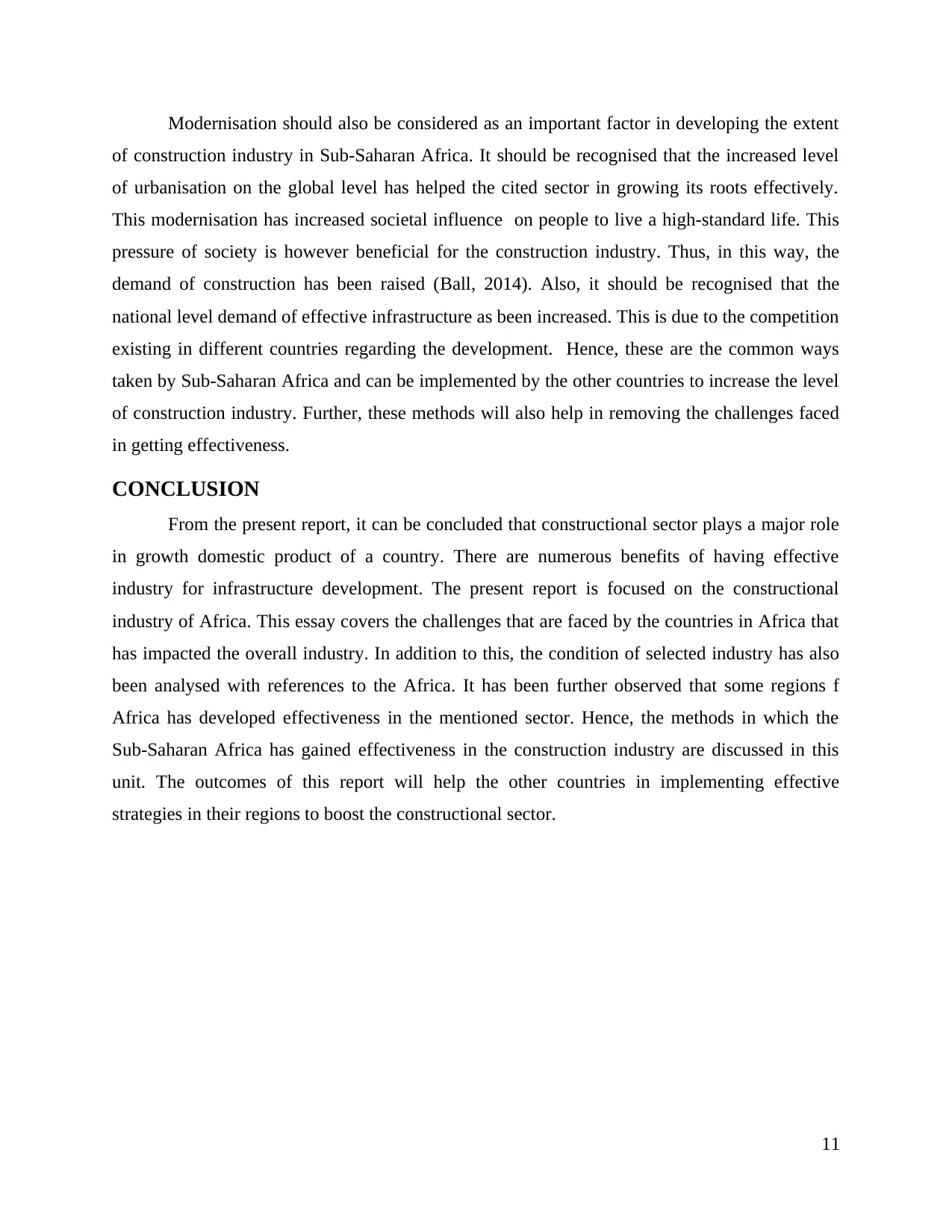
Modernisation should also be considered as an important factor in developing the extent
of construction industry in Sub-Saharan Africa. It should be recognised that the increased level
of urbanisation on the global level has helped the cited sector in growing its roots effectively.
This modernisation has increased societal influence on people to live a high-standard life. This
pressure of society is however beneficial for the construction industry. Thus, in this way, the
demand of construction has been raised (Ball, 2014). Also, it should be recognised that the
national level demand of effective infrastructure as been increased. This is due to the competition
existing in different countries regarding the development. Hence, these are the common ways
taken by Sub-Saharan Africa and can be implemented by the other countries to increase the level
of construction industry. Further, these methods will also help in removing the challenges faced
in getting effectiveness.
CONCLUSION
From the present report, it can be concluded that constructional sector plays a major role
in growth domestic product of a country. There are numerous benefits of having effective
industry for infrastructure development. The present report is focused on the constructional
industry of Africa. This essay covers the challenges that are faced by the countries in Africa that
has impacted the overall industry. In addition to this, the condition of selected industry has also
been analysed with references to the Africa. It has been further observed that some regions f
Africa has developed effectiveness in the mentioned sector. Hence, the methods in which the
Sub-Saharan Africa has gained effectiveness in the construction industry are discussed in this
unit. The outcomes of this report will help the other countries in implementing effective
strategies in their regions to boost the constructional sector.
11
of construction industry in Sub-Saharan Africa. It should be recognised that the increased level
of urbanisation on the global level has helped the cited sector in growing its roots effectively.
This modernisation has increased societal influence on people to live a high-standard life. This
pressure of society is however beneficial for the construction industry. Thus, in this way, the
demand of construction has been raised (Ball, 2014). Also, it should be recognised that the
national level demand of effective infrastructure as been increased. This is due to the competition
existing in different countries regarding the development. Hence, these are the common ways
taken by Sub-Saharan Africa and can be implemented by the other countries to increase the level
of construction industry. Further, these methods will also help in removing the challenges faced
in getting effectiveness.
CONCLUSION
From the present report, it can be concluded that constructional sector plays a major role
in growth domestic product of a country. There are numerous benefits of having effective
industry for infrastructure development. The present report is focused on the constructional
industry of Africa. This essay covers the challenges that are faced by the countries in Africa that
has impacted the overall industry. In addition to this, the condition of selected industry has also
been analysed with references to the Africa. It has been further observed that some regions f
Africa has developed effectiveness in the mentioned sector. Hence, the methods in which the
Sub-Saharan Africa has gained effectiveness in the construction industry are discussed in this
unit. The outcomes of this report will help the other countries in implementing effective
strategies in their regions to boost the constructional sector.
11
⊘ This is a preview!⊘
Do you want full access?
Subscribe today to unlock all pages.

Trusted by 1+ million students worldwide
1 out of 15
Related Documents
Your All-in-One AI-Powered Toolkit for Academic Success.
+13062052269
info@desklib.com
Available 24*7 on WhatsApp / Email
![[object Object]](/_next/static/media/star-bottom.7253800d.svg)
Unlock your academic potential
Copyright © 2020–2026 A2Z Services. All Rights Reserved. Developed and managed by ZUCOL.





